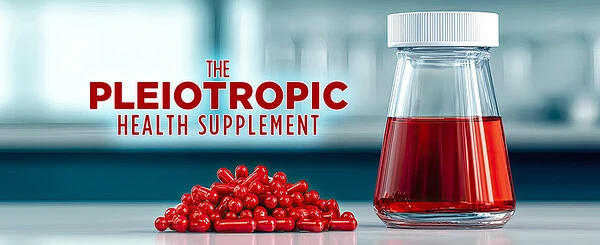The Pleiotropic Health Supplement
I. Introduction
Numerous studies indicate that a particular substance holds remarkable potential for health, extending beyond its muscle - building and testosterone - increasing capabilities. However, its full benefits remain to be fully realized.
Most medications in medical practice are "mono - targeted," meaning they act on a single biochemical pathway to combat disease. The challenge lies in the fact that the majority of chronic diseases result from the malfunction or dysregulation of multiple genes, not just one. Thus, there is a pressing need for a departure from targeted therapies and a shift towards the utilization of "pleiotropic" substances. These substances can produce multiple effects and address the dysregulation of multiple genes.
This is the concept put forward by a group of researchers (Singh, et al.). They conducted a meta - study on a substance that appears to possess the desired pleiotropic effects. Intriguingly, this substance is not a traditional drug but resveratrol (available for purchase on Amazon).
II. Resveratrol and the French Paradox
Resveratrol received little attention until the 1990s, when the "French Paradox" emerged. Despite consuming a diet rich in foods that typically predispose individuals to cardiovascular issues, French men had a relatively low incidence of cardiovascular disease. This paradox was attributed to the resveratrol present in red wine, which is derived from grapes.
Subsequently, the association between resveratrol and reduced cardiovascular disease spurred two decades of intensive research on resveratrol. Singh and colleagues identified an astonishing 244 completed resveratrol trials. Their paper comprehensively reviews all the clinical data and details the use of this supplement in preventing and managing various ailments.
III. What the Studies Demonstrate
Resveratrol has proven efficacy in addressing a wide range of health issues, highlighting its ability to modulate multiple molecules and chemical pathways. These include:
Diabetes, Obesity, and Metabolic Syndrome: Resveratrol functions by reducing blood glucose levels and hemoglobin A1c, while also enhancing insulin sensitivity.
Cancer: Given its multi - targeting properties, researchers are optimistic about resveratrol's potential in cancer treatment. It shows promise in several types of cancer, such as colon cancer, breast cancer, and multiple myeloma.
Inflammatory Diseases: Resveratrol effectively mitigates inflammation in various conditions, including cardiovascular inflammation and ulcerative colitis.
Non - Alcoholic Fatty Liver Disease: A clinical trial revealed that resveratrol (600 mg per day for three months) decreased glucose, insulin resistance, cholesterol, and the liver enzymes ALT and aspartate aminotransferase in patients with non - alcoholic fatty liver disease.
Neurological Diseases: Multiple genes and pathways, particularly those related to oxidative stress and mitochondrial damage, are associated with Alzheimer's disease and cognitive impairment. Resveratrol has shown potential in alleviating these conditions. It is also thought to aid in anxiety and depression by enhancing "cerebrovascular responsiveness."
Cardiovascular Disease: A multitude of factors, including hypertension, hyperlipidemia, and diabetes, can lead to heart malfunction. Resveratrol's cardio - protective and multi - targeting properties make it a promising candidate for cardiovascular health. The compound "appears to have significant therapeutic potential against CVDs."
Kidney Diseases: Animal studies have demonstrated "well - proven utility" of resveratrol in treating diabetic nephropathy, drug - induced injury, ischemia - reperfusion, and sepsis - induced kidney injury.
Miscellaneous Diseases: Resveratrol has shown varying degrees of effectiveness in treating specific conditions, including polycystic ovary syndrome, cataracts, high blood pressure, rhinopharyngitis in children, acne vulgaris (using resveratrol cream), anxiety, schizophrenia, Parkinson's disease, endometriosis, sports concussions, knee discomfort, cellulite, and spastic paraplegia.
IV. Effects of Resveratrol on Athletes and Lifters
Resveratrol can be aptly described as a performance - enhancing supplement. While not covered in Singh's discussion on its use in disease states, numerous studies have demonstrated its benefits. For instance, resveratrol supplementation, at least in animals, increased testosterone by 51.6%. Additionally, it is a potent aromatase inhibitor. By reducing the conversion of testosterone to estrogen, it further boosts testosterone levels.
This polyphenol has also been shown to promote the growth of longer and stronger muscle fibers. Montesanto et al. found that resveratrol induces the differentiation of young muscle cells (myoblasts), controls regulatory factors, and influences the synthesis of muscle - specific proteins. Resveratrol signals IGF - 1 through several regulating enzymes, which activate proteins and induce hypertrophic morphological changes.
V. A Potential Drawback
Although the body efficiently absorbs resveratrol, its bioavailability is relatively low. It is absorbed rapidly but is often metabolized and excreted just as quickly. In fact, standard resveratrol, despite having an absorption rate of approximately 70%, has a bioavailability of only about 1%. Nevertheless, clinicians have documented all the beneficial effects mentioned above.
Imagine the enhanced potential of a resveratrol product with significantly increased bioavailability. Enter Rez - V (available for purchase on Amazon), which contains pure resveratrol dissolved in a mixture commonly used in the pharmaceutical industry to enhance drug bioavailability.
For general health purposes, a daily dose of 200 mg (assuming high bioavailability) may be sufficient. However, to increase testosterone, lower estrogen, increase muscle fiber size, or have an impact on the conditions outlined in Singh's research paper, doses of up to 600 mg per day may be necessary. A serving of Rez - V (two softgels) contains 600 mgs.
VI. References
Singh AP et al. "Health benefits of resveratrol: Evidence from clinical studies." Med Res Rev. 2019 Sep;39(5):1851 - 1891. PubMed: 30741437.
Montesano A et al. "Resveratrol promotes myogenesis and hypertrophy in murine myoblasts." J Transl Med. 2013 Dec 13;11:310. PubMed: 24330398.
Shin S et al. "trans - Resveratrol Relaxes the Corpus Cavernosum Ex Vivo and Enhances Testosterone Levels and Sperm Quality In Vivo." Arch Pharm Res. 2008 Jan;31(1):83 - 7. PubMed: 18277612.
Unlocking the Power of Trans-Resveratrol
•
Author: Flint
•
fitness
sport
life

Share this article
